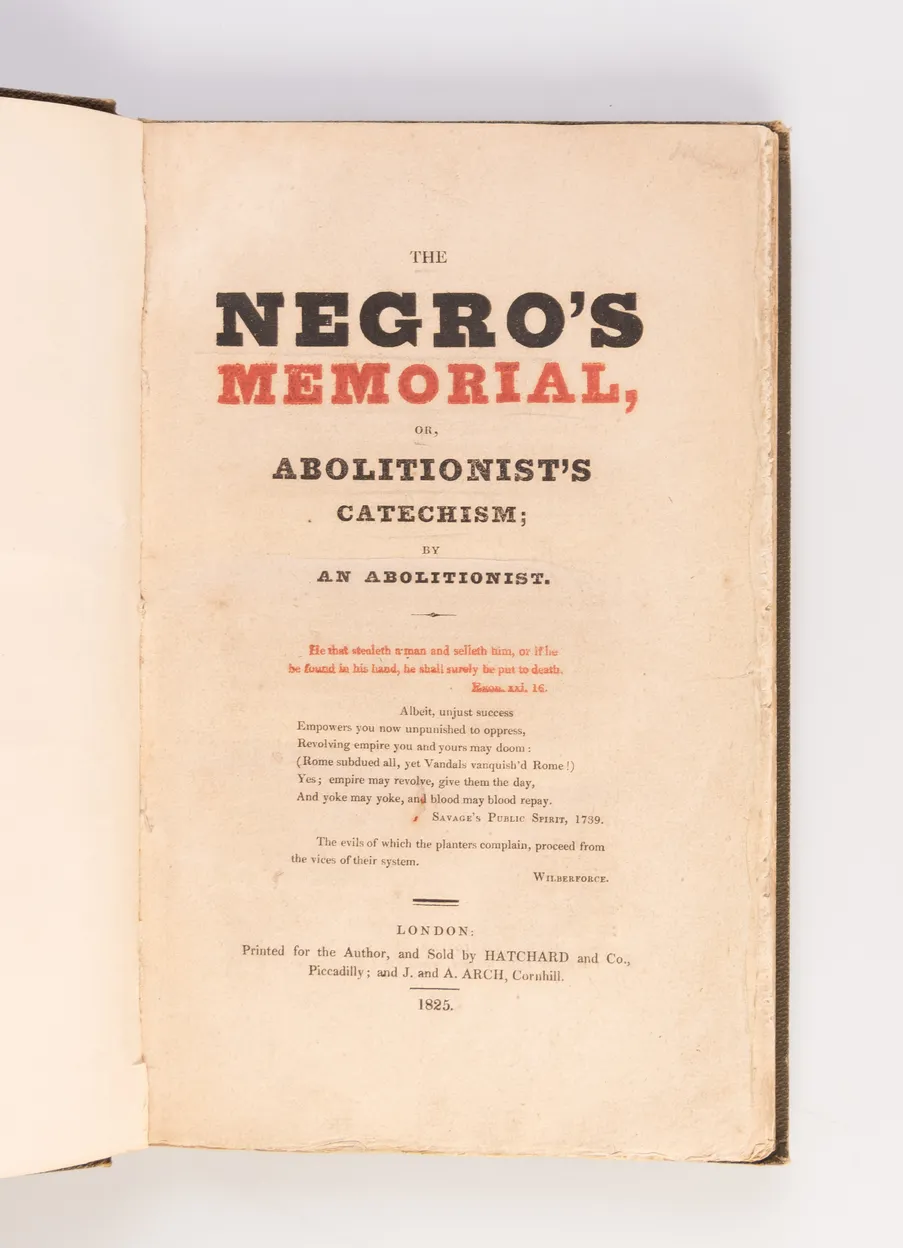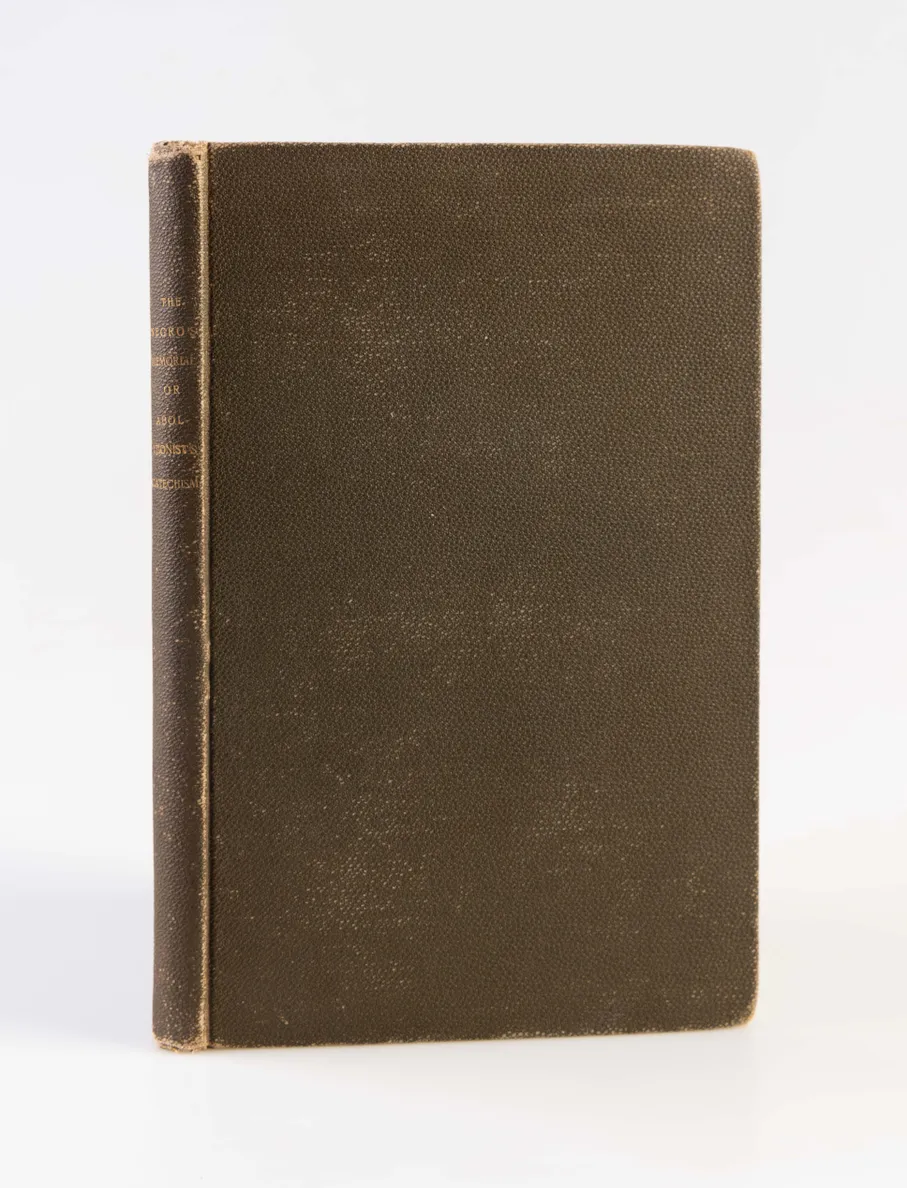Rare and important: this catechism in eight chapters, largely focussed on slavery in the Caribbean, includes the third printing of Ottobah Cugoano's Narrative ...
Thomas Fisher (1772-1836) was a British abolitionist, artist and antiquary. Starting with the basics ("What is slavery?"), the work progresses to the political and economic complexities of the slave-trade. Fisher writes in the introduction that "recent transactions in Demerara" – the slave uprising known as the Demerara Rebellion of 1823 – had prompted the work, and that "information which he had thus acquired, if digested into a small compass, and presented in a familiar garb, might be both acceptable and useful to many persons..." (pp. III-IV).
However, this work is notable for the printing of the narrative of Ottobah Cugoano in the Appendix – among the rarest of slave narratives. Born Quobna Ottobah Cugoano in 1757 in present-day Ghana, he was kidnapped and enslaved in the West Indies at age 13. Purchased by Scottish plantation owner Thomas Campbell, Cugoano travelled with him to England in 1772 where he would be emancipated, baptized and take the name John Stuart. In the mid-1780s, he became associated with Olaudah Equiano, and together they formed a Black abolitionist organization, The Sons of Africa. In 1787, two years before Equiano would publish his own narrative, Cugoano published Thoughts and Sentiments on the Evil and Wicked Traffic of the Slavery and Commerce of the Human Species. A second abridged edition appeared in 1791, and both are extremely rare.
According to a printed note at the start of the Appendix, Fisher had evidently received a copy of the first edition of Cugoano shortly before finishing his work: "It is, nevertheless, a narrative of such high interest, and exhibits the slave-trade and slavery in such striking colours, throwing light upon not a few of the most important facts which form the argument of this work, that he could not resist the temptation to give it as an appendix, leaving it to operate unassisted upon the minds of his readers, and to inspire them, according to their respective mental constitutions, either with admiration or detestation of the Slave-Trade and Negro Slavery." What follows extracts the personal narrative of Cugoano from that work.
Beginning, "I was early snatched away from my native country ...", he describes the kidnapping in detail before turning to the middle passage: "And when we found ourselves at last taken away, death was more preferable than life..." Sent to Grenada, he describes the violence and cruelty working in the sugar cane fields: "Thus seeing my miserable companions and countrymen in this pitiful, distressed and horrible situation, with all the brutish baseness and barbarity attending it, could not but fill my little mind with horror and indignation." Once in London he learns to read and write, and the extracted narrative ends: "Since, I have endeavoured to improve my mind in reading, and have sought to get all the intelligence I could, in my situation of life, towards the state of my brethren and countrymen in complexions, and of the miserable situation of those who barbarously sold into captivity, and unlawfully held in slavery."
"Of the four major writers of African descent – Ignatius Sancho, John Marrant, Quobna Ottobah Cugoano (John Stuart) and Olaudah Equiano (Gustavus Vassa) – whose works were first published in London in the 1780s, Cugoano remains the most radical and the least familiar" (Vincent Carretta, Introduction to the 1999 Penguin edition). Two states of the first edition of Fisher's Negro's Memorial are known, with and without date on the title.
Sabin, 52275; not in Afro-Americana or Blockson.



